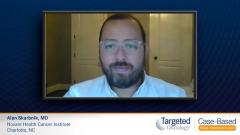
Follicular Lymphoma: Emerging Treatments
An oncologist ruminates on emerging treatment options in follicular lymphoma and offers some clinical pearls.
Alan Skarbnik, MD: Because of the challenges we see, particularly with patients who have early disease progression, POD24 [progression of disease within 24 months], there are a number of clinical trials trying to address what may be the best way to salvage these patients and provide longer-term remissions.
The combination of novel agents with or without chemotherapy is being studied. CAR [chimeric antigen receptor] T-cell therapy as a second line for patients who present with POD24 is being studied as well to see if using that approach earlier provides a better outcome.
A number of these trials are single arm and are not being compared to what we have available or to stem cell transplantation. Hopefully in the future we’re going to have those types of comparisons to better understand what would be the best sequence for these patients.
There’s still a lot we don’t know. Choosing frontline therapy for
This needs to be tweaked patient to patient, looking at the goals of the patient, comorbidities, fitness, performance status, how long did it take for disease to recur, or how long the remission lasted.
Those are questions that are still open, and unfortunately we don’t have the right answers yet. Fortunately, we have options, and I do underline the importance of clinical trials. For patients who do present with relapsed disease, particularly POD24, if a clinical trial is available, I certainly recommend looking at the rationale for the clinical trial to see if it’s appropriate because it may provide benefits for the patients and also for the physicians to best understand how to treat this disease.
In general, my personal approach for treating follicular lymphoma is again, largely patient dependent and of course physician dependent, and experience with certain regimens versus not. For patients who can tolerate chemoimmunotherapy, I do prefer a bendamustine-based approach in the frontline setting. But for patients who present with very bulky disease, or where there is a concern for high-grade transformation but not proven, or patients who present with grade 3b disease, for these patients, I prefer a CHOP [cyclophosphamide, doxorubicin, vincristine, prednisone] approach.
For younger patients who are receiving bendamustine, I tend to use obinutuzumab as the bendamustine partner, but using rituximab is certainly a good option as well.
The question of maintenance versus no maintenance will be decided between physician and patient, understanding that maintenance does provide PFS [progression-free survival] improvement but does not provide overall survival improvement.
In the setting of the [COVID-19] pandemic, using an anti-CD20 monoclonal antibody for a prolonged period may be counterproductive, particularly with the untoward effects it has on the vaccination for SARS-CoV-2.
Now, for patients who are not fit or are not adequate for chemoimmunotherapy, I tend to choose rituximab alone or rituximab with lenalidomide in the frontline setting. For these patients I do tend to use the published regimen with rituximab.
For patients with early stage disease that is in a single site and who are younger, we may consider radiation therapy with a potentially curative intent, but certainly observation and active surveillance for these patients is also appropriate.
For patients with relapsed disease, again it depends whether the progression of disease happened within 24 months of initial therapy or not. For patients with POD24 who are fit, I do generally recommend referring to a transplant center and using an intense chemotherapy salvage regimen, followed by autologous stem cell transplantation consolidation, if a clinical trial is not available.
For patients who are not fit to undergo that approach, I do believe that lenalidomide plus rituximab, if they did receive a frontline chemoimmunotherapy, is a valid approach. For those patients who received lenalidomide in the frontline setting, then trying other novel agents may be more advisable if they’re not fit to undergo chemoimmunotherapy at that point.
Transcript edited for clarity.
A 60-Year-Old Man with Follicular Lymphoma
Initial presentation
A 60-year-old man presents with a 4-month history of fatigue, decreased appetite, occasional fevers, and a 7-lb unintentional weight loss
PMH: Unremarkable
PE: palpable right axillary lymph nodes, ~2.5 cm and bilateral cervical lymph nodes, ~3 cm, spleen palpable 4 cm below left costal margin
Clinical workup
Labs: ANC 1.6 x 10^9, WBC 11.4 x 10^9, lymphocytes 42%, HB 9.7 g/dL, plt 97 x10^9, LDH 402U/L, 3.4 B2M ug/mL; HBV negative
Excisional biopsy of axillary lymph node on IHC showed CD20+, CD3+, CD5+, BCL2+, Follicular lymphoma grade 2
Bone marrow biopsy showed paratrabecular lymphoid aggregates, 38% involvement
Cytogenetics: t(14:18) (Q32;q21)
Molecular testing: EZH2 wild type
PET/CT showed right axillary, bilateral cervical, and mediastinal lymphadenopathy (3.1 cm, 3.1 cm, and 2.6 cm respectively)
Ann Arbor Stage IV, ECOG PS is 1
Treatment
Patient was treated with obinutuzumab plus cyclophosphamide, doxorubicin, vincristine, and prednisone (CHOP) chemotherapy. He completed 6 cycles and treatment was well tolerated.
He continued on obinutuzumab maintenance.
19 months later, he complains of fevers, chills, and worsening fatigue.








































